

Tsingtao cuts capex
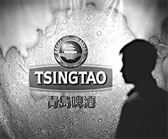
Tsingtao Brewery Co Ltd, China's best-known beer brand, recently announced a drastic cut in its capital spending this year as consumption is expected to drop in a fiercely competitive market.
Tsingtao Chairman Jin Zhiguo told a news conference that capex would fall to 900 million yuan ($131.8 million) in 2009 from 2 billion yuan in 2008.
The company is targeting 20 percent growth in sales of its Tsingtao brand - which comprised nearly half of the company's overall sales last year - compared with a 25.6 percent increase in 2008.
"Overall industry growth rate this year will not be higher than last year," Sun Mingho, president director of Tsingtao, told the news conference.
Industry growth, measured by production volume, was 5.5 percent last year, the slowest pace since 2005.
Premium revenue grows
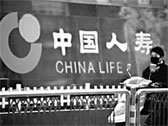
China Life Insurance Co said its revenue from premiums grew 2 percent in the first three months of 2009 compared with the same period in 2008.
The world's biggest life insurer by market value collected 104 billion yuan ($15 billion) in premiums in the first quarter, up from 102.2 billion yuan a year earlier, it said in a filing to the Shanghai Stock Exchange.
China Life said last month it would adopt a conservative investment strategy that focuses mostly on fixed-income products in 2009, after seeing its 2008 profit plunge during the global market turmoil. China Life and smaller rival China Ping An Insurance (Group) Co suffered from a collapse in investment returns last year as the country's benchmark Shanghai Composite Index tumbled nearly 70 percent.
Lower profit growth
China Communications Construction, the country's top builder of highways and ports, posted a lower-than-expected 18 percent rise in second-half earnings despite improved margins on lower raw-material prices.
But the company, which competes with China Railway Construction and China Railway Group, is expected to benefit from a central government stimulus package that significantly boosts spending on infrastructure construction.
China's investment in fixed assets for transportation and communication this year will likely reach 1 trillion yuan ($146.4 billion) and planned investment for railway construction is 600 billion yuan, the company said in a statement.
More metal stockpiling
China's top zinc producer, Hunan Nonferrous Metals Corp Ltd, plans to spend 1.2 billion yuan ($176 million) to build up metal reserves as prices slump, the Hunan Daily reported.
Chinese government agencies and smelters are building up metal stockpiles to support the loss-making industry. The purchases reduce supply in domestic markets and help buoy prices.
Hunan Nonferrous plans to ask banks for a loan to buy lead, zinc, tungsten, antimony and indium from its smelters, and will sell down the stockpiles when their prices recover, the newspaper said.
The report did not breakdown the metal purchases. Company officials were not available for comment.
Alibaba hires manager
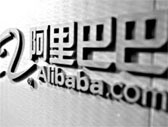
Alibaba Group, China's largest e-commerce company, hired a fund manager to help it better manage up to $220 million of the group's cash, a source said.
Alibaba Group hired Xiong Xiong, a former executive at Goldman Sachs and the founder of Libra Capital, who would be responsible for less than 10 percent of the group's $2.2 billion cash, said the source.
Xiong will head a new fund management company meant to help increase Alibaba's return on investment, he said.
The news comes after the company's fourth-quarter net profit slid 35.4 percent from the preceding quarter, missing expectations set by increasing spending on marketing to counter deteriorating trade flows.
Petrochemical partners
Japan's Mitsubishi Chemical Holdings Corp said it would enter a strategic partnership with China's Sinopec in petrochemicals to lower procurement and development costs and expand market share.
Mitsubishi Chemical, which is seeking new revenue streams in China, said it would discuss further ties with Sinopec in areas such as organic solar cells and synthetic rubber materials.
The agreement covers joint research, materials procurement, logistics and personnel exchange.
Sinopec and Mitsubishi Chemical have worked together in polypropylene compounded resins used to make bumpers and panels for cars. The two are also building a bisphenol A plant and a polycarbonate plant in China to supply materials used to make DVDs and car headlights.
CITIC profit falls
CITIC Resources Holdings, China's fourth largest oil producer, said its 2008 net profit fell 28 percent due to tumbling oil prices but it would continue to look for crude oil projects at home and overseas.
The oil and metals unit of CITIC Group also said the energy and commodities sectors will continue to feel pressure this year due to the global economic downturn.
Shrugging off short-term price volatility, CITIC Resources said it would continue to expand its business by acquisitions with a focus on the oil sector.
"We are looking hard for new oil projects in China and overseas," CEO Sun Xinguo told reporters in a briefing.
But Sun also said any new investment would depend on cash flow.
Wal-Mart reassigns staff
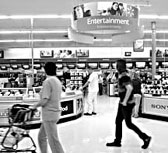
Wal-Mart Stores Inc, the world's largest retailer, said it plans to avoid compulsory job cuts in China as it seeks to improve efficiency and growth at its stores in the country by eliminating one layer of management.
The company is looking to reassign "a few mid-level management positions" per store, Vivi Mou, public relations manager at Wal-Mart China, said in an e-mail reply to questions. The retailer, which has 147 outlets and employs 50,000 people in the country, will offer affected workers the option to move to positions in new stores, she said.
Employees who opt not to relocate may be reassigned to other jobs in the same store and their wages will be adjusted as existing positions are removed, Jonathan Dong, the retailer's Beijing-based spokesman, said.
Bayi posts loss
Xinjiang Bayi Iron & Steel Co Ltd posted a loss of 100.4 million yuan in the first quarter this year on weak demand for its products, price distortions and increased provisioning for falling inventory values.
"The low demand from downstream industries played a great part in the company's sales slide in the first quarter. The dropping steel price along with the relatively higher raw material costs also had an impact," the Shanghai-listed company said in a statement.
During the same period last year, Bayi Steel, which is controlled by Baosteel and is the largest steel smelter in the Xinjiang Uygur autonomous region, had a net profit of 118 million yuan, with its earning per share hitting 0.20 yuan.
Analysts said Bayi's growth has softened since last year. In 2008, the northwestern steelmaker posted a net profit of 103 million yuan, down 73.96 percent year-on-year, while earning per share fell by 73 percent year-on-year to 0.14 yuan.
Port throughput slows
Shanghai International Port expects slower throughput and profit growth this year and will suspend a plan to jointly run a container terminal with A.P. Moeller-Maersk Group, the China Securities Journal reported.
Throughput is expected to top out at 29 million twenty-foot equivalent units (TEUs) in 2009, up 3.6 percent from a year earlier, meaning the profit growth of more than 20 percent seen over the past few years is not likely to be achieved again in the near future, the newspaper said, quoting Shanghai International Port Group Co president Chen Xuyuan.
The net profit of China's biggest port operator jumped 26.9 percent last year to 4.62 billion yuan ($676 million) on a 13.8 percent rise in revenue. Throughput in 2008 grew 7 percent, the newspaper said.
The company signed a framework agreement in September 2006 to buy 40 percent of a container terminal in Zeebrugge, Belgium, built by APM Terminals, part of Moeller-Maersk, and to jointly run the project.
Acer sales up, targets HP
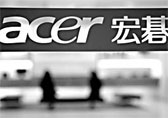
Acer Inc may overtake Hewlett-Packard Co as the largest notebook-computer vendor before its 2011 target, led by sales of low-cost netbooks and slim laptops that run for eight hours, Chairman J.T. Wang said.
"I look at our competitors as being passive in the netbook segment," Wang said in Taipei, where Acer is based. "We are leading our competitors by six to nine months."
Acer widened its lead over Dell Inc and narrowed the gap with Hewlett-Packard last year as sales of its Aspire One helped the Taiwan-based company capture the top spot in the market for sub-$500 netbooks, the fastest-growing segment of the personal-computer industry.
(China Daily 04/20/2009 page9)













